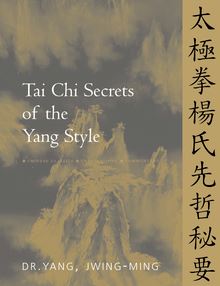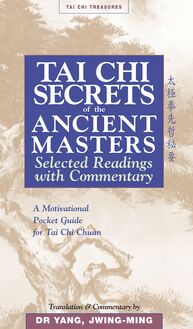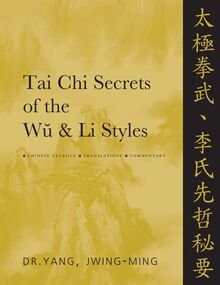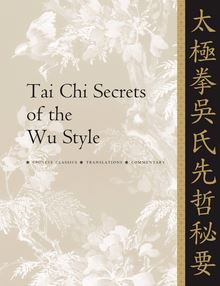-
 Univers
Univers
-
 Ebooks
Ebooks
-
 Livres audio
Livres audio
-
 Presse
Presse
-
 Podcasts
Podcasts
-
 BD
BD
-
 Documents
Documents
-
- Cours
- Révisions
- Ressources pédagogiques
- Sciences de l’éducation
- Manuels scolaires
- Langues
- Travaux de classe
- Annales de BEP
- Etudes supérieures
- Maternelle et primaire
- Fiches de lecture
- Orientation scolaire
- Méthodologie
- Corrigés de devoir
- Annales d’examens et concours
- Annales du bac
- Annales du brevet
- Rapports de stage
La lecture à portée de main
Vous pourrez modifier la taille du texte de cet ouvrage
Découvre YouScribe en t'inscrivant gratuitement
Je m'inscrisDécouvre YouScribe en t'inscrivant gratuitement
Je m'inscrisEn savoir plus
Vous pourrez modifier la taille du texte de cet ouvrage
En savoir plus

Description
Share the Secrets of Great Tai Chi!
Over the course of several centuries the Ancient Masters practiced and pondered the mystery and purpose of Tai Chi Chuan, preserving their profound insights in songs and poems. Shrouded in secrecy, these songs and poems were closely guarded jewels and have only been revealed to the public this century.
Now, you can reap the benefits of centuries of wisdom and practical experience to deepen and refine your Tai Chi Chuan. Discover ways to reach the essence of your Form and take your Push Hands (and sparring!) to higher levels, for not only has Dr. Yang, Jwing-Ming translated these poems from the original Chinese, he has written additional commentaries to make them more accessible to contemporary minds. Insights from the Masters of Tai Chi Chuan is an invaluable resource for students who seek true understanding of their art.
- Can be used with any style of Tai Chi Chuan.
- Sound, practical advice for any Martial Art.
- Includes commentaries, translation, and original Chinese.
- Key points for incorporating the teachings into your practice.
- Poems from Chang San-Feng and other great Masters!
Sujets
Informations
| Publié par | YMAA Publication Center |
| Date de parution | 16 août 2020 |
| Nombre de lectures | 0 |
| EAN13 | 9781594391873 |
| Langue | English |
| Poids de l'ouvrage | 5 Mo |
Informations légales : prix de location à la page 0,0648€. Cette information est donnée uniquement à titre indicatif conformément à la législation en vigueur.
Extrait
TAI CHI SECRETS OF THE ANCIENT MASTERS
TAI CHI SECRETS of the ANCIENT MASTERS
Selected Readings with Commentary
Translation Commentary by Dr. Yang, Jwing-Ming
YMAA Publication Center
Wolfeboro, NH USA
Publisher s Cataloging-in-Publication
(Provided by Quality Books, Inc.)
Tai chi secrets of the ancient masters: selected readings with commentary / translation commentary by Dr. Yang, Jwing-Ming. - 1st ed.
p. cm. - (Tai chi treasures ; 2)
LCCN: 98-61694
ISBN: 1-886969-71-X
1. Chinese poetry. 2. T ai ch i ch uan-Poetry.
I. Yang, Jwing-Ming, 1946-
PL2518.8.M37Y36 1999 895.1 1
QBI98-1723
YMAA Publication Center
PO Box 480
Wolfeboro, NH 03894
www.ymaa.com info@ymaa.com
Copyright 1999 by Yang, Jwing-Ming
All rights reserved including the right of reproduction in whole or in part in any form.
Contents
Foreword
Introduction
1. Taijiquan Treatise
2. Taijiquan Classic
3. Four Important Sentences
4. Thirteen Important Keys of Regulating the Body
5. Song of Eight Words
6. Three Important Theses of Taijiquan
7. The Five Mental Keys to Diligent Study
8. Song of Pushing Hands
9. Song of the Real Meaning
10. Taijiquan Fundamental Key Points
11. Song of Application
12. Old Taijiquan Classic of Qing Qian Long Dynasty
13. Song of Comprehension and Application
14. Song of the Thirteen Postures
Appendix A: Original Chinese of the Poems and Treatises
Appendix B: Translation and Glossary of Chinese Terms
About the Author
Foreword
The wisdom of Taijiquan is precious, and that is why it was kept in secrecy for so many centuries. In this way, the more exact memory of how to so fully enrich and protect life has been practiced and preserved. Now, the secrets are being opened for us. A comparison of the poetry of Taijiquan, to the poems of European and even other Asiatic civilizations, reveals the unique qualities that make the Taiji poems both instructive and heraldic of mystery.
Poetry is often given to the poet by the deliberate forces of life, the forces of a rare and difficult talent, in a lifetime where wisdom is essential to this talent. Poetry is the gift of painting and singing the emotions, what these Taijiquan secret poems refer to as heart and mind. European poetry and culture do not have such a subject as Taiji, a military art that offers spiritual enlightenment and transcendence-the sublime. However, for all their differences, traditions in European poetry and Chinese poetry-secret or esoteric in whatever degree-both broadly celebrate the effort to live, to love.
Anna Akhmatova, the great Russian poet, wrote these lines in Requiem :
The mountains bend before this grief
The great river does not flow
But the prison locks are strong .
This could have been a comment on Taiji Push Hands, but that was not Akhmatova s intention. It is instead meant for the suffering and the dead in the Stalinist Soviet Union. In the same way, Homer s Iliad and Odyssey have the emotive and evocative power in imagery drawn from nature, images which may remind one of the uses of nature in Taijiquan poems. Still, it is more the lyric poem in European writing that approaches the feeling of Taijiquan poetry, lyric poems such as those of Akhmatova or John Dunne, to name just two. As feelings are the palette of both the Western lyric and Taijiquan, it is here where the two poetic traditions have a common meeting place, a communion.
In the Taijiquan secret poems, we see all life being celebrated in the practice of the art, perhaps the greater part of life in the solo form. The names of the postures themselves have the evocative power of poetry. Witness Fair Lady Works at the Shuttles, or Grasp Sparrow s Tail. In these poems, a single word carries the wisdom and practice of many generations, all of them convinced of the body s innate wisdom. The Taijiquan secret poetry tells us to love and cherish life, both as it is revealed to us through our practice, and as it is further hidden as our understanding deepens.
The poet Stephen Shu-ning Liu writes in his poem My Father s Martial Art these words:
don t retreat into night, my father
Come down from the cliffs
Dr. Yang Jwing-Ming has brought the secrets from the cliffs.
Afaa Michael Weaver
November, 1998
Introduction
In the last seven centuries, many songs and poems have been composed about Taijiquan. These have played a major role in preserving the knowledge and wisdom of the masters, although in many cases the identity of the authors and the dates of origin have been lost. Since many Chinese people of previous centuries were illiterate, many of the key points of the art were put into poems and songs, which are easier to remember than prose, and passed down orally from teacher to student. Treatises, which usually are more profound than the poems and songs, were also passed down. These documents were regarded as secret, and it was only in the twentieth century that they were revealed to the general public.
Almost all of the documents currently available can be categorized into four groups. The first group is the most general; it includes the most ancient documents, written either by known or unknown authors, and also those authors who do not belong to a specific style. The second of these four groups is comprised of those poems, songs, or treatises passed down by ancestors of Yang, Chen, and Wu families. This small book will introduce the first group with twenty-one poems, songs, and treatises. Many of these are considered the most popular of their kind, and are the most accurate in presenting the art of Taijiquan. In the near future, the other groups of documents will be translated and presented in similar fashion.
It should come as no surprise to the reader that it is very difficult to translate ancient Chinese writings into modern English. Because of the cultural differences, many expressions simply do not make any sense, if translated literally. Often, knowledge of the historical context is necessary. Furthermore, since every sound has several possible meanings, anybody who has ever tried to reduce these poems to writing has had to choose from among these different meanings. Over the course of several generations, this has led to variation among the poems. The same problem occurs when the poems are read. Many Chinese characters have several possible meanings, so reading involves interpretation of the text, even for the Chinese. Also, the meaning of many words has changed over the course of time. When you add to this the grammatical differences (generally, no tenses, no articles, no distinction between singular and plural, and no differentiation between parts of speech) it becomes almost impossible to provide a literal translation from Chinese to English.
With these difficulties in mind, I have attempted to convey as much of the original meaning of the Chinese as possible, based on my own thirty-seven years of Taiji experience and understanding. Although it is impossible to totally translate the original meaning, I feel that I have managed to express the majority of the important points. The translation has been made as close to the original Chinese as possible, including such things as double negatives and, sometimes, idiosyncratic sentence structure. Words that are understood but not actually written in the Chinese text have been included in parentheses. Also, some Chinese words are followed by the English in parentheses, e.g. Shen (Spirit) and some English words are followed by original Chinese, e.g. Essence (Jing). To further assist the reader, I have included commentary with each poem, song, and treatise. For your further reference, the original Chinese of each document is included in Appendix A . In addition, a glossary of Chinese terms is included in Appendix B for your convenience.
1. Taijiquan Treatise 1 , 5
by Zhang, San-Feng
Once in motion ,
Entire body must be light (Qing) and agile (Ling) ,
(It) especially should (be) threaded together .
Qing Ling, the Chinese words that are translated light and agile, are used to describe the movement of monkeys: responsive, controlled, and able to move quickly. This line implies that the body s movement must be soft, relaxed, smooth, natural, and comfortable. When this happens, there is no body tightness, no stagnation of Qi, and no mental confusion. Softness will enter into your every motion, and you will move naturally, quickly and efficiently.
The body should be a coherent whole, with all of its parts connected and unified by the energy (Qi) moving within them, like ancient Chinese coins connected by a string. Taiji Jin (martial power) is classified as a soft Jin. In order to manifest soft Jin, the body must act like a soft whip to express the power forward. All of the joints must be soft and relaxed. The muscles on the limbs and in the torso must also remain relaxed. You must practice the movements until they feel completely natural and effortless. If the muscles and the joints are tensed, then the Jin manifested will be hard, and will not penetrate. Such hard power is not a characteristic of Taijiquan.
Qi should be full and stimulated (Gu Dang) ,
Shen (Spirit) should be retained internally .
In Chinese, Gu Dang means a drum that is full and resounding (due to vibration). The Qi that is generated and stored in the Lower Dan Tian should be full, like an air filled drum which can produce powerful vibrations. When your Qi is full and stored in the Lower Dan Tian, your life energy will be strong. Consequently, the Qi led by the mind through the body will be abundant, and your Jin will be powerful. In order to store the Qi abundantly, you must learn Embryo Breathing (Tai Xi), and in order to lead the Qi to the entire body, you must learn Small Circulation and Grand Circulation meditation. Such purely internal work, performed independently of your form practice, will enable you to apply the principles into your Taiji.
Doing Taiji practice, although the Qi is fu
-
 Univers
Univers
-
 Ebooks
Ebooks
-
 Livres audio
Livres audio
-
 Presse
Presse
-
 Podcasts
Podcasts
-
 BD
BD
-
 Documents
Documents
-
Jeunesse
-
Littérature
-
Ressources professionnelles
-
Santé et bien-être
-
Savoirs
-
Education
-
Loisirs et hobbies
-
Art, musique et cinéma
-
Actualité et débat de société
-
Jeunesse
-
Littérature
-
Ressources professionnelles
-
Santé et bien-être
-
Savoirs
-
Education
-
Loisirs et hobbies
-
Art, musique et cinéma
-
Actualité et débat de société
-
Actualités
-
Lifestyle
-
Presse jeunesse
-
Presse professionnelle
-
Pratique
-
Presse sportive
-
Presse internationale
-
Culture & Médias
-
Action et Aventures
-
Science-fiction et Fantasy
-
Société
-
Jeunesse
-
Littérature
-
Ressources professionnelles
-
Santé et bien-être
-
Savoirs
-
Education
-
Loisirs et hobbies
-
Art, musique et cinéma
-
Actualité et débat de société
- Cours
- Révisions
- Ressources pédagogiques
- Sciences de l’éducation
- Manuels scolaires
- Langues
- Travaux de classe
- Annales de BEP
- Etudes supérieures
- Maternelle et primaire
- Fiches de lecture
- Orientation scolaire
- Méthodologie
- Corrigés de devoir
- Annales d’examens et concours
- Annales du bac
- Annales du brevet
- Rapports de stage









